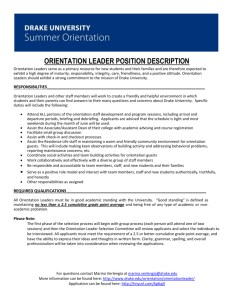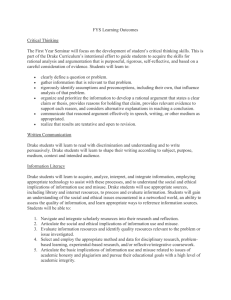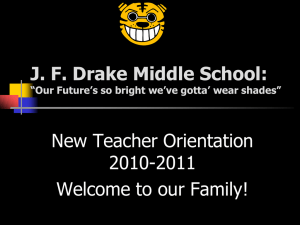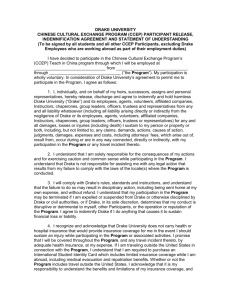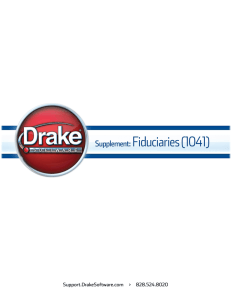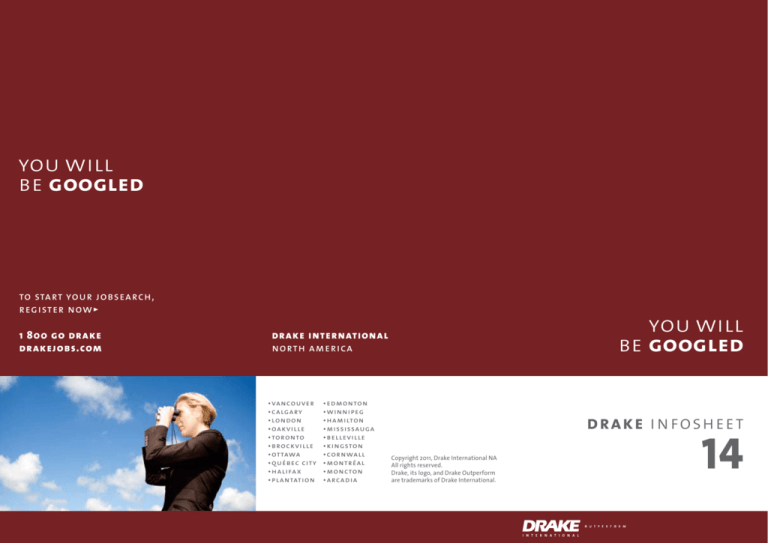
you will
be googled
to start your jobsearch, register now>
1 800 go drake
drakejobs.com
you will
be googled
drake international
north america
•vancouver
•calgary
•london
•oakville
•toronto
•brockville
•ottawa
•québec city
•halifax
•plantation
•edmonton
•winnipeg
•hamilton
•mississauga
•belleville
•kingston
•cornwall
•montréal
•moncton
•arcadia
drake infosheet
Copyright 2011, Drake International NA
All rights reserved.
Drake, its logo, and Drake Outperform
are trademarks of Drake International.
14
you will be googled
Managing Your Online Reputation
We live in the digital age. Beyond that, we live in a time when anyone, anywhere can share any piece of information they like. And we
have many ways for doing so – Facebook, LinkedIn, Twitter, YouTube,
Flickr, blogs, and wikis are just a few of the sites or tools we use to
connect and share with others all over the world. More than likely,
you’re a participant – but even if you aren’t actively posting information about yourself online, there is a very good chance that information about you exists on the Internet. Some things about Web
2.0 make our lives better. However, when it comes to job searching,
the way we use the Internet today can have serious implications.
You will be Googled
Whether it is right or not, during your job search, assume that you
will be Googled. When a recruiter or human resources professional
comes across your resume, there is a good chance that they are going to Google you to see what comes up. And when they do, they’re
going to see everything – the good, as well as the bad. In today’s
world, you need to manage your online reputation. It can make the
difference between landing an interview and never hearing back
after submitting your resume – and always wondering what went
wrong.
So, how do you manage your online reputation? Here are some
tips.
1. Google Yourself
The first step to managing your online reputation is to Google yourself. You need to see what others see when they enter your name
into their favourite search engine. Carefully consider the results.
Do they paint an accurate picture of who you are? Did any results
come up that make you uncomfortable? Do you see anything that
you wouldn’t want a recruiter or your future boss to see? Go beyond the first page – check the first five pages (as well as the image
results) to get a really good idea of the information you’re putting
out into cyberspace.
If you are unhappy with your search results, it’s time to take action
to make them more reflective of who you are and how you want
to be perceived. You may choose to delete some of your online ac-
1 800 go drake
drake infosheet 14
counts, or specific photos, videos, or updates you’ve posted. In some
cases, you may need to ask friends to remove certain items from their
online accounts or blogs. It can be an uncomfortable conversation to
have, but it is necessary. It can take a few days for Google to register
changes, so check back weekly to make sure that your changes are
taking hold, and that your search results are becoming more appropriate for a job search.
2. Check Your Privacy Settings
While you’re waiting for your changes to register in Google, check
the privacy settings for each of your online accounts. Consider all of
the services you use regularly, as well as the ones you sometimes
use. Consider upping the privacy settings on sites like Facebook,
YouTube, and Flickr. Unless you are extremely careful about what you
post – and can trust your friends to do the same – make your privacy
settings as limited as possible. Check that the changes reflect your
intentions by logging out and then trying to access your profiles to
ensure that you’re happy with the results. Remember – it’s great to
be connected via your online profiles, but only if they’re serving you,
or at least not limiting you, throughout your job search and career.
Remember that, while privacy settings are great, you can’t count on
them: Everything you post on the Internet is public. For more on this,
see below.
3. Use A Filter
When you’re posting information on the Internet, be aware that everything is public. There is no guarantee that when you delete something, it is really gone. Your best bet is to assume that anyone in the
world can see everything you post online, and to act with a filter that
reflects the perception that you’re looking to build of yourself.
4. Be Proactive
To take the probability that you will be Googled to the next level, be
proactive. Since you know that recruiters are going to research you
online, do your best to make sure that the information they come
across represents you – or the person you want them to know. You
can do many things to improve your online reputation. Spend extra time on your LinkedIn profile – write an informative introduction to who you are, explain in point form the responsibilities at
each of your previous jobs, and ask former employers to recommend you. Use your Twitter account to post updates and links that
are relevant to your industry and your career – and connect with
other like-minded people by following them. You may even want to
start a blog, using a free service like Wordpress.com, to share your
thoughts as they relate to your dream job, industry, or career with
the world. You can also link all of these services across your online
profiles, so that a recruiter looking you up online can easily get a
sense of who you are – simply by clicking on the information that
you’re providing them.
Make the Internet Work for You
By recognizing that we live in the digital age and taking action
to ensure that your online reputation lives up to your offline
reputation, you can make the Internet work in your favour. By
understanding how you appear online to someone who’s never met you, you can actually make potential employers excited
to meet you face-to-face – simply because of what they’ve
seen from you online. By following the tips outlined above,
you’ll be well on your way to ensuring that the fact that you
will be Googled won’t hold you back during your job hunt – or
throughout your career.
Before posting something online, consider its implications. If you’re
about to post something that you wouldn’t want a future employer
to see, don’t do it! Check your spelling and grammar, especially on
more professional social networking sites like LinkedIn. Make sure
that profile photos are appropriate – select headshots that you feel
are a good representation of who you are. The point is to be selective with the information you post online. While it is important to
be yourself, it’s also important to understand that the web is public
– and to act with this in mind.
drakejobs.com

